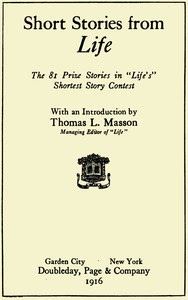Short Stories From Life
Shortest Story Contest
Thomas L. Masson
Doubleday, Page & Company
1916
Doubleday, Page & Company
translation into foreign languages,
including the Scandinavian
CONTENTS
Introduction
By Thomas L. Masson
Thicker Than Water (First Prize)
By Ralph Henry Barbour and George Randolph Osborne
The Answer (Second Prize)
By Harry Stillwell Edwards
Her Memory (Third Prize Divided)
By Dwight M. Wiley
Business and Ethics (Third Prize Divided)
By Redfield Ingalls
N. B.
By Joseph Hall
The Clearest Call
By Brevard Mays Connor
Greater Love Hath No Man
By Selwyn Grattan
The Gretchen Plan
By William Johnston
The Glory of War
By M. B. Levick
The Aviator
By Hornell Hart
Loyalty
By Clarence Herbert New
Moses Comes to Burning Bush
By W. T. Larned
North of Fifty-three
By Mary Woodbury Caswell
The Old Things
By Jessie Anderson Chase
The Forced March
By Hornell Hart
Approximating the Ultimate with Aunt Sarah
By Charles Earl Gaymon
The Horse Heaver
By Lyman Bryson
The Ego of the Metropolis
By Thomas T. Hoyne
The Gay Deceiver
By Howard P. Stephenson
In Cold Blood
By Joseph Hall
Housework—and the Man
By Freeman Tilden
His Journey’s End
By Ruth Sterry
Food for Thought
By Harriet Lummis Smith
Hope
By Edward Thomas Noonan
Collusion
By Lincoln Steffens
Faithful to the End
By Clair W. Perry
Arletta
By Margaret Ade
Which?
By Joseph Hall
What the Vandals Leave
By Herbert Riley Howe
Ben. T. Allen, Atty., vs. Himself
By William H. Hamby
The Joke on Preston
By Lewis Allen
The Idyl
By Joseph F. Whelan
Withheld
By Ella B. Argo
Up and Down
By Bertha Lowry Gwynne
Patches
By Francis E. Norris
The Arm at Gravelotte
By William Almon Wolff
The Bad Man
By Harry C. Goodwin
Nemesis
By Mary Clark
The Black Door
By Gordon Seagrove
The Man Who Told
By John Cutler
The Unanswered Call
By Thomas T. Hayne
The Women in the Case
By Mary Sams Cooke
The Cat That Came Back
By Virginia West
“Solitaire” Bill
By Arthur Felix McEachern
Just a Pal
By Elsie D. Knisely
When “Kultur” Was Beaten
By Lieutenant X
Presumption of Innocence
By Lyman Bryson
A Mexican Vivandière
By H. C. Washburn
Mother’s Birthday Present
By Carrie Seever
Red Blood or Blue
By E. Montgomery
Impulsive Mr. Jiggs
By Roger Brown
Tomaso and Me
By Graham Clark
The Old Grove Crossing
By Albert H. Coggins
Lost and Found
By John Kendrick Bangs
You Never Can Tell
By “B. MacArthur”
The Escape
By A. Leslie Goodwin
Two Letters, a Telegram, and a Finale
By H. S. Haskins
The Intruder
By Reginald Barlow
Molten Metal
By Hornell Hart
The Winner’s Loss
By Elliott Flower
The Recoil of the Gun
By Marian Parker
“Man May Love”
By Robert Sharp
One Way—and Another
By Noble May
The Black Patch
By Randolph Hartley
A Shipboard Romance
By Lewis Allen
The Coward
By Philip Francis Cook
The Heart of a Burglar
By Jane Dahl
The Reward
By Herbert Heron
The First Girl
By Louise Pond Jewell
A Sophistry of Art
By Eugene Smith
The Message in the Air
By B. R. Stevens
In a Garden
By Catherine Runscomb
A Clever Catch
By Lloyd F. Loux
Strictly Business
By Lincoln Steffens
The Advent of the Majority
By Stella Wynne Herron
The Night Nurse
By Will S. Gidley
Why the Trench Was Lost
By Charles F. Pietsch
The King of the Pledgers
By H. R. R. Hertzberg
A Po-lice-man
By Lincoln Steffens
The Quest of the V. C.
By A. Byers Fletcher
Somewhere in Belgium
By Percy Godfrey Savage
The PDF might take a minute to load. Or, click to download PDF.
If your Web browser is not configured to display PDF files. No worries, just click here to download the PDF file.


No comments:
Post a Comment